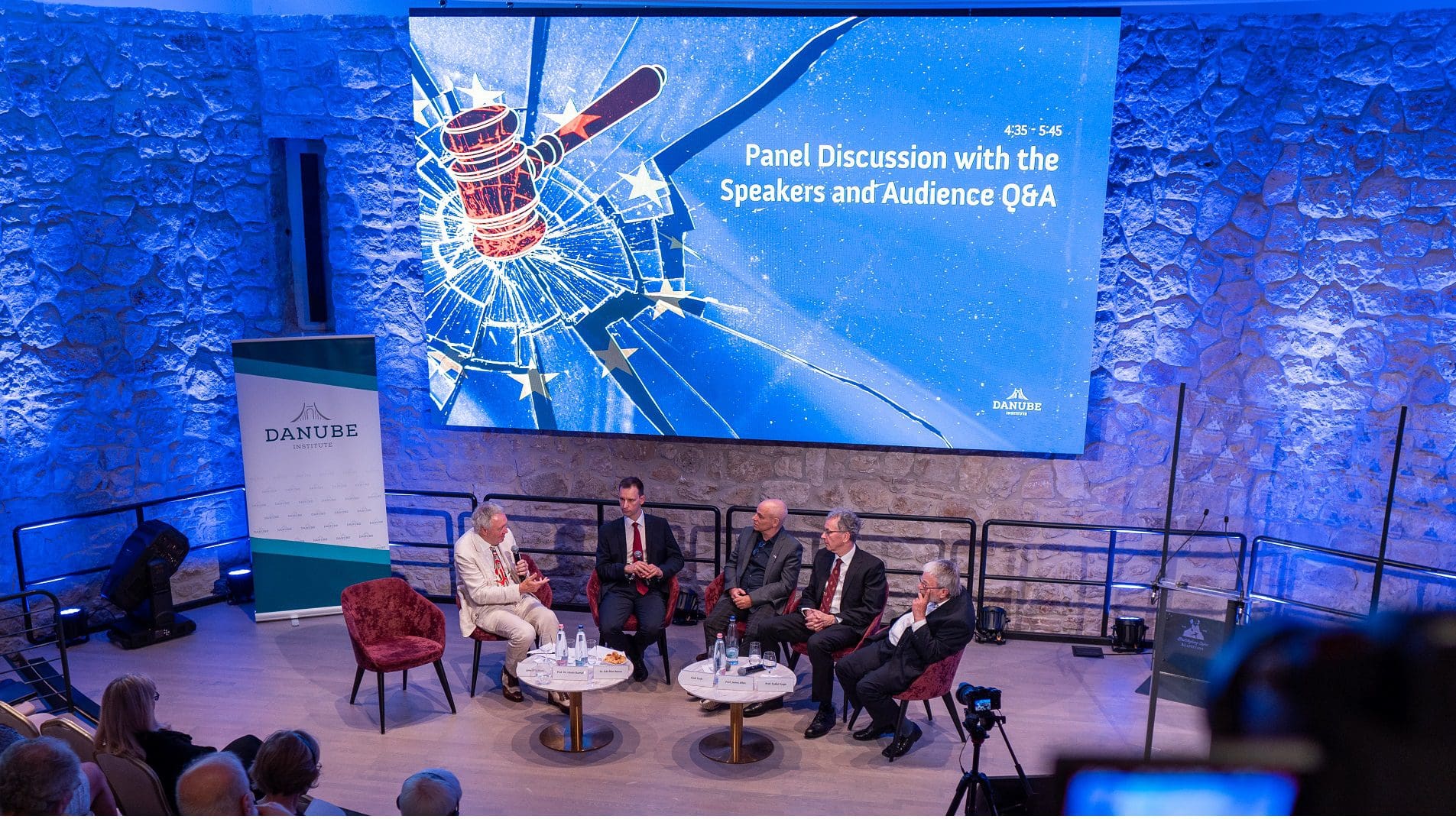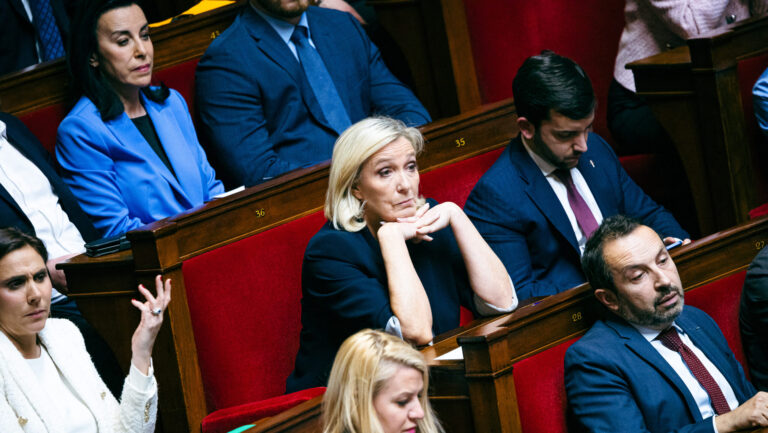A whole slate of legal and political experts gathered in the theatre room of the Lónyay-Hatvany Villa in the historic Castle District of Budapest. Danube Institute President John O’Sullivan greeted the distinguished guests, with a few words about the main theme of the afternoon, one with an ever-so-elusive definition, ‘rule of law’. Mr O’Sullivan referred to it as a phrase ‘signifying approval and praise’ these days, something every country wants to be associated with, in a positive sense. However, he also pointed out that the concept may be more than a benevolent way to asses the checks and balances on powers in certain countries.
Professor Csaba Varga, a Professor Emeritus from Pázmány Péter Catholic University, was the first to take the stage. He provided a historical overview of how the usage of the phrase in question, ‘rule of law’, changed over the decades. According to the Professor, in the 1960s in Hungary, it was used in a historical, non-descriptive sense. This changed in the 1980s, when it started to be used to criticise the old socialist system in its end stages, as in accusing it of lacking in terms of the rule of law. In the 1990s, the usage changed again, and it became an ‘all-purpose hammer by the Constitutional Court’, as Professor Varga put it, thus taking on a negative connotation.
He then went on to talk about the phrase ‘rule of law’ in an international context. It first appeared in Marquis de Lafayette and Abbé Sieyès’ 1789 Declaration of the Rights of Man and of the Citizen, written with the help of then-US Secretary of the State and Founding Father Thomas Jefferson, amidst the prelude of the French Revolution. Then, during the Cold War, Western academics wrote and spoke about the concept in the context of criticising the Soviet Union and the Communist Bloc, similar to 1980s Hungary. Today, however, the term is being politicised, and
it is a tool to shame or blackmail certain countries into doing certain things,
all according to Professor Varga.
Gadi Taub, Senior Lecturer at the Federmann School of public policy at the Hebrew University of Jerusalem, spoke at length about the attempted judicial reforms in his home country of Israel, and how it resulted in what he called a ‘coup d’etat’ by the elite. He told the audience that the Israeli Supreme Court has excessive power, such as the authority to veto appointments to their bench (thus ensuring a liberal ideological hegemony forever), retroactively change legislation and contracts, have a say in the country’s international diplomacy, and more. For all these reasons,
Mr Taub believes Israel is currently a ‘judiocracy’:
the people are being ruled by a class of elite law school graduates, representing the values of the Israeli Labour Party which failed to pass the parliamentary threshold in the last election.
Prime Minister Netanyahu tried to pass a set of judicial reform bills to remedy the situation. However, the liberal-slanted mainstream media viciously attacked him for it, and demonstrators took to the street (Mr Taub believes this was an organised effort), accusing him of attempting a coup and undermining the rule of law when, in Mr Taub’s opinion, it is in fact the liberal opposition that is doing so. The speaker when on to say that the situation got so bad that a squadron in the Israeli Air Force threatened to disobey commands if the bill in fact passes. Mr Taub believes this has been a real coup, a veritable mutiny to undermine the will of a government elected by the people, on a platform that explicitly stated that they are for judicial reform. Yet, because of the ensuing chaos, PM Netanyahu announced he is s temporarily halting his efforts of judicial reform.
István Stumpf has recently made the headlines in the Hungarian news media for resigning from his leading position at the Foundation For the University of Tokaj only days before speaking at the Danube Institute event. Although he was one of the key intellectual figures around the period of the system change, today he is best known for having served on the Constitutional Court of Hungary between 2010 and 2019. Justice Stumpf held a lecture about the increasing importance of constitutional identity. He pointed out that the Constitutional Court of Hungary predates the first freely elected government after the regime change, as it was formed in 1989. The modified Constitution took effect on 1 January 1990, thus the first parliamentary election was held under the framework outlined in the document. Its primary author was the first President of the Court László Sólyom, who later went on to serve as President of Hungary, and heavily relied on the German model while drafting it.
Justice Stumpf described this process of the regime change as ‘a rule of law revolution’, although he did concur that this term is somewhat oxymoronic, since ‘rule of law very much symbolises stability and revolution very much symbolises government change’.
He then when on to talk about the conflicting concepts of legal constitutionality and political constitutionality. As he put it,
‘Legal constitutionality is very much based on fundamental rights, and gives much more power to the courts. And political constitutionalists regularly say that the elected members of parliament, they have the right to say the final word, not the Constitutional Court’.
This debate was at the forefront when the Fidesz-KDNP coalition, headed by Prime Minister Viktor Orbán, first took a two-thirds majority in the National Assembly in 2010, which gave them the power to amend the Constitution, which was then quickly transformed into the Fundamental Law of Hungary.

Professor James Allen of the University of Queensland in Australia first lamented the fact that views that were considered mainstream and centrist a few decades ago, positions in line with President John F. Kennedy’s, are now often deemed right-wing, or even far-right. Ideas such as prioritising equality of opportunity over equality of outcome, or a preference for capitalism over socialism, had this fate. He then went on to describe the important differences between the procedural definitions of democracy versus the substantive, moral definition of democracy.
The former proposes that if the way governments are elected meets certain criteria, as in, every person over 18 years gets to cast a vote, they cannot be coerced or bribed into or against voting for someone, the ballots are secret, etc., then a government chosen that way is by definition a democracy. The latter, however, requires more than an honest process to elect an administration. That administration then needs to adhere to a certain, vaguely defined moral code for the country to be still considered a democracy.
While Professor Allen prefers the procedural definition, as he believes it better serves an open public debate, many liberal scholars like to go with the substantive, moralist one.
To close the slate of lectures, Ákos Bence Gát, head of foreign affairs at the Danube Institute, talked about the constant scrutiny the Orbán administration has to deal with, coming from the European Union. He pointed out the inconsistency in that while in 2014, even the Council’s legal service wrote in a letter to the Commission that ‘there is no legal basis in the treaties’ for the Commission’s Rule of Law Framework, it ended up being implemented anyway. Similarly, in 2017, the Commission deemed the European Parliament’s request to issue annual rule of law reports on member states unnecessary. However, by 2019, the annual reports were introduced by the Commission after all.
János Bóka’s Remarks at the Danube Institute
For the second part of the event, State Secretary for European Affairs János Bóka sat down to have a discussion with Mr Gát in front of a captivated audience.
Mr Bóka started by stating he does not believe rule of law is a legal concept, rather, a political one, that got ‘judicialised’ over time, and is being re-politicised again. Another trend he sees in modern politics that he disapproves of is that domestic issues are now being brought to the European level. Meanwhile, the debate about the division of competencies between the EU and its member states is no longer even on the table. Mr Bóka believes that certain institutional decisions are not judged based on whether they are in compliance with the treaties, rather, if they move the EU closer to being a federal entity.
‘My understanding of how the European Union works is from a lawyer’s perspective, where we have these treaties. These treaties contain specific rules and some principles as to the separation of powers and competencies between the Union and the states. I believe this system can be operated in this legal framework with a satisfactory degree of certainty. But this is not what we do. And there is no way we can meaningfully engage in an intellectual discussion with the European institutions on the separation of powers between the EU and the states’, he stated.
On the same note, he also claimed he believes
the EU is a cooperation project, not an integration project.
He also touched on the current state of the frozen EU funds due to be paid to Hungary, the negotiations on which are partly led by him. Mr Bóka shared how peculiarly, when the legal council for the EU Commission defended their decision in front of the European Court of Justice to withhold those funds, they argued it is for protecting the financial interest of the European Union, as they were well aware that EU treaties give them no such right for alleged rule of law violations. However, publicly, EU officials are constantly communicating that this measure was taken to force the Orbán administration to comply with the Union’s rule of law standards.
He went on to point out that while Hungary is the only member state under the so-called ‘budgetary conditionality procedure’, it is not the only country to not have received the Covid recovery funds. In fact, despite the pandemic breaking out over three years ago, six EU countries have not received any of the recovery money for various reasons, while five others have only received partial, advanced payments.








